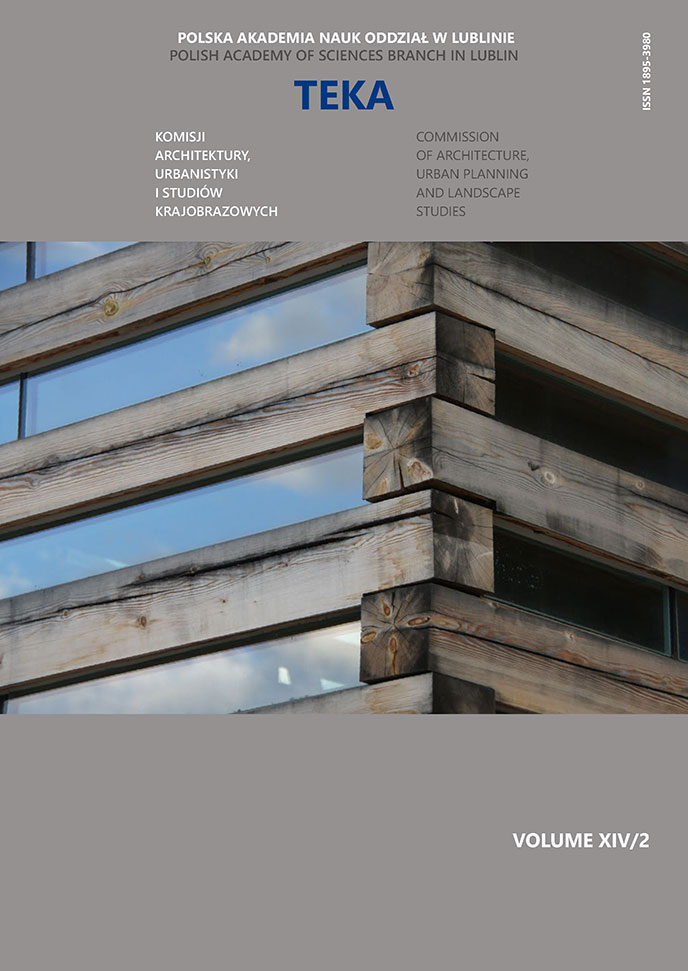The paradox of safety in urban space
Article Sidebar
Issue Vol. 14 No. 2 (2018)
-
Town of Zhovkva (Żółkiew) in western Ukraine – an example of urban complex built at the end of the 16th century on the concept of the renaissance “ideal town”
Mykola Bevz7-20
-
Architect Max Zucker – regionalist or modernist? Designs from the Prut valley in the Hutsul region
Jacek Czubiński21-27
-
Tracking nature – the possibilities of introducing permaculture strategies into the historical city centre of Zamość. The Courtyards
Katarzyna Kielin28-37
-
Search of futuristic principles for the concept of the medical center for young people
Oleg Krasylnykov, Viktor Proskuryakov, Hayane Akopyan38-42
-
Allotment gardens in the Lublin downtown in the spatial and urban planning context – origins and issues concerning their preservation
Natalia Przesmycka, Rafał Strojny43-58
-
Shaping space in practical therapy
Piotr Gleń59-63
-
Assessment of use of public transport in cities by elderly and disabled persons
Katarzyna Solecka, Małgorzata Figura64-75
-
Stone wood and metal in the memorial sculpture of Ukrainian historical cemeteries of the Polish-Ukrainian borderlands
Olena Stasyuk76-82
-
Evaluation of the protection status of masonry crowns and proposals for their repairs – the castle in Janowiec on the Vistula
Maciej Trochonowicz, Bartosz Szostak, Daniel Lisiecki, Wojciech Królikowski83-91
-
The paradox of safety in urban space
Hubert Trammer92-96
-
Shaping of the systems of greenery in the districts of Lublin Cooperative Housing (LSM) in the context of planning and implementation of the project
Kamila Boguszewska, Natalia Przesmycka97-110
-
Location of single-family house settlements from 60s to 80s of 20th century in Wrocław’s urban space
Zuzanna Napieralska111-116
-
Eyetracking as a method to create new possibilities in urbanistic experimental research
Wojciech Kocki, Bartłomiej Kwiatkowski, Magdalena Borys, Mariusz Dzieńkowski, Wioletta Tuszyńska-Bogucka, Jacek Bogucki, Jarosław Pełka117-124
-
Recovery of urban development stages of town Rashkiv
Illia Lytvynchuk, Mykola Bevz, Bogusław Szmygin125-137
Archives
-
Vol. 16 No. 4
2020-12-30 11
-
Vol. 16 No. 3
2020-09-30 10
-
Vol. 16 No. 2
2020-06-30 11
-
Vol. 16 No. 1
2020-03-31 10
-
Vol. 15 No. 4
2019-12-30 6
-
Vol. 15 No. 3
2019-10-31 9
-
Vol. 15 No. 2
2019-06-28 12
-
Vol. 15 No. 1
2019-03-29 13
-
Vol. 14 No. 3
2018-10-28 14
-
Vol. 14 No. 2
2018-06-29 14
-
Vol. 14 No. 1
2018-03-30 13
-
Vol. 13 No. 4
2017-12-29 8
-
Vol. 13 No. 3
2017-09-29 9
-
Vol. 13 No. 2
2017-06-30 10
-
Vol. 13 No. 1
2017-03-31 10
-
Vol. 12 No. 4
2016-12-30 12
-
Vol. 12 No. 3
2016-09-30 10
-
Vol. 12 No. 2
2016-06-30 9
-
Vol. 12 No. 1
2016-03-31 8
Main Article Content
DOI
Authors
Abstract
Mutual penetration of pedestrian and vehicle traffic in many cases produces better effects in terms of the quality of staying in the city, and even safety, than their sharp separation. The present article discusses examples of such solutions.
Keywords:
References
Czarnecki, Bartosz, and Waldemar Siemiński. Kształtowanie bezpiecznej przestrzeni publicznej. Warszawa: Difin, 2004.
Gehl, Jan. Life between Buildings: Using Public Space. Translated by Jo Koch. Washington, Clovelo, London: Island Press, 2011.
Gehl, Jan. Cities for People. Washington, Clovelo, London: Island Press, 2010.
Kubecka, Magdalena, and Bartosz Zimny. “Kierowca syty i pieszy cały.” Magazyn Miasta 14 (2016): 133.
mar. “Warszawa: auto potrąciło pasażera… na stacji metra.” gazeta.pl 2007 http://wiadomosci.gazeta.pl/wiadomosci/1,114873,3944269.html


